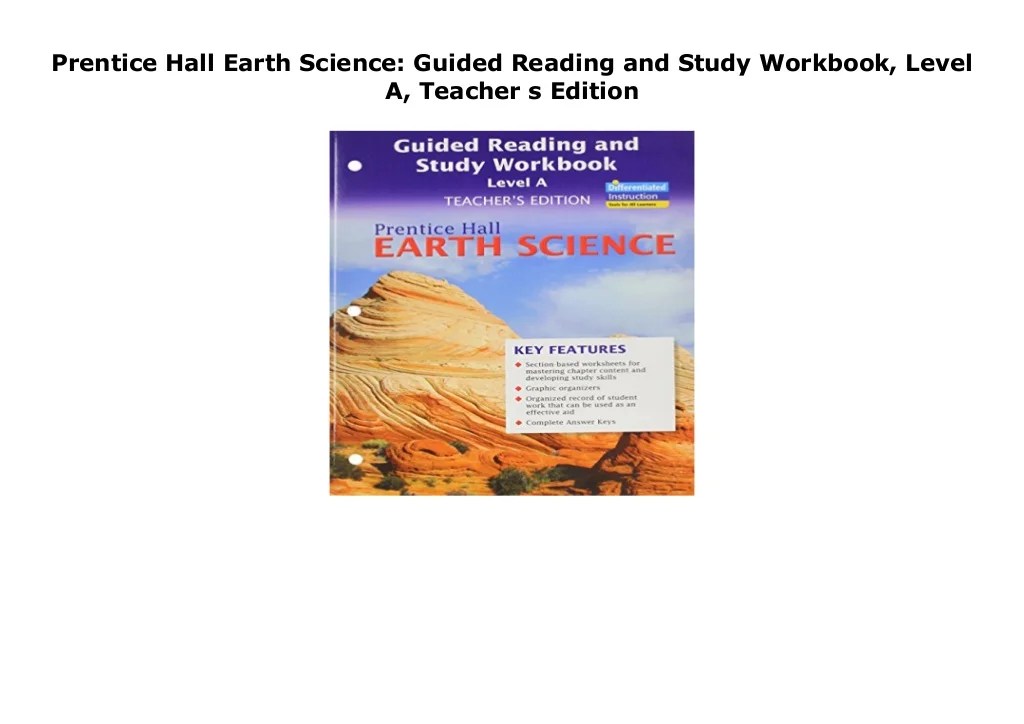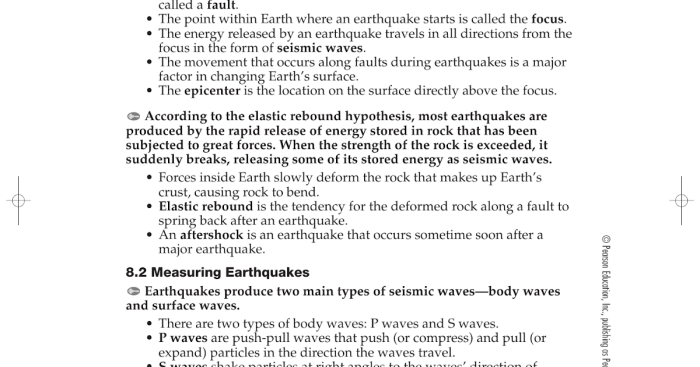Earth science guided reading study workbook answers provide a comprehensive resource for students seeking to master the fundamental principles of Earth science. This meticulously crafted guidebook offers detailed solutions to the questions posed within the study workbook, fostering a deeper understanding of geology, meteorology, oceanography, and astronomy.
By delving into the intricate connections between Earth’s systems, this guide empowers learners to critically analyze real-world phenomena and apply their knowledge to novel situations.
Throughout this guide, students will encounter engaging guided reading activities that stimulate critical thinking and encourage the application of concepts to novel scenarios. The inclusion of interactive learning experiences, such as simulations, games, and hands-on activities, transforms complex scientific ideas into captivating and comprehensible concepts.
By harnessing the power of technology, this guide enhances the learning process, fostering a genuine passion for Earth science.
Earth Science Concepts: Earth Science Guided Reading Study Workbook Answers

Earth science encompasses the study of our planet, its systems, and its place in the universe. It is a multidisciplinary field that draws on geology, meteorology, oceanography, and astronomy to understand the Earth’s composition, structure, processes, and history.
Geology investigates the Earth’s solid components, including its rocks, minerals, and landforms. Meteorology focuses on the Earth’s atmosphere and its weather patterns. Oceanography explores the Earth’s oceans and their physical, chemical, and biological processes. Astronomy examines the Earth’s place in the solar system and beyond.
These disciplines are interconnected and influence each other. For example, geological processes can shape the Earth’s surface, which in turn affects weather patterns. Ocean currents can transport heat and nutrients around the globe, influencing climate and ecosystems. The Earth’s rotation and tilt affect the distribution of sunlight, which drives weather patterns and ocean circulation.
Guided Reading Activities
Guided reading activities can help students focus on key Earth science concepts and develop critical thinking skills.
- Provide students with a text that presents Earth science concepts in a clear and concise manner.
- Ask students to read the text and answer questions that require them to recall facts, understand concepts, and apply their knowledge to new situations.
- Encourage students to discuss their answers with each other and with the teacher.
Study Workbook Answers
Study workbook answers provide students with feedback on their understanding of Earth science concepts.
- Answers should be detailed and explain the reasoning behind the correct answer.
- Answers should provide supporting evidence from the text or other sources.
- Answers should offer additional resources for students who want to learn more about the topic.
Interactive Learning, Earth science guided reading study workbook answers
Interactive learning experiences can make Earth science concepts more engaging for students.
- Use simulations to allow students to explore Earth science processes in a virtual environment.
- Use games to make learning Earth science concepts fun and competitive.
- Use hands-on activities to help students visualize and understand complex ideas.
Assessment Strategies
Assessment strategies can help teachers measure students’ understanding of Earth science concepts.
- Use quizzes to assess students’ recall of facts and concepts.
- Use tests to assess students’ understanding of more complex concepts and their ability to apply their knowledge to new situations.
- Use projects to assess students’ ability to conduct research and present their findings in a clear and concise manner.
Frequently Asked Questions
What is the purpose of the earth science guided reading study workbook answers?
The earth science guided reading study workbook answers provide detailed solutions to the questions posed within the study workbook, fostering a deeper understanding of geology, meteorology, oceanography, and astronomy.
How do the guided reading activities contribute to learning?
The guided reading activities stimulate critical thinking and encourage the application of concepts to novel scenarios, enhancing the learning process.
What is the significance of interactive learning experiences in this guide?
Interactive learning experiences, such as simulations, games, and hands-on activities, transform complex scientific ideas into captivating and comprehensible concepts.
